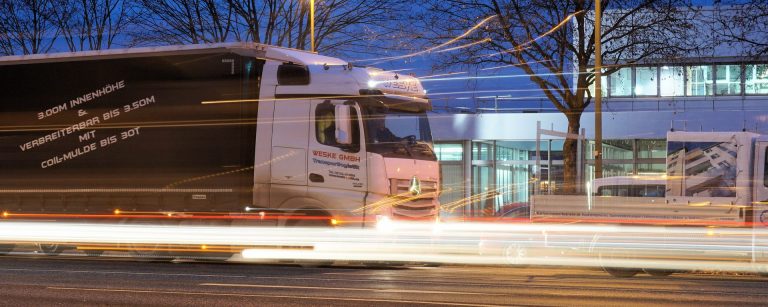Climate-friendly and traffic-optimized solutions for freight transport in the Baltic Sea region

The decarbonization of the transport sector is one of the great challenges of our time. In Sweden, for example, the transport sector consumes around 25% of all energy consumption and contributes 40% of all CO 2 emissions. Measures to reduce greenhouse gas emissions often focus on passenger transport, although freight transport performance is increasing faster and the energy consumption of freight transport has not decreased between 2005 and 2011.
In addition to greenhouse gas emissions, increasing freight traffic comes with numerous other challenges, including noise and congestion of city centers. The aim must therefore be to make freight traffic not only climate-friendly, but also to reduce traffic. That is why Low Carbon Logistics is researching solutions to optimize freight traffic and testing them in several municipalities in the Baltic Sea region. The project is also intended to contribute to the cross-border exchange of knowledge and experience with innovative logistics solutions.
In the project, the IKEM examines the compatibility of the developed concepts and the pilot projects with the legal framework in each of the five partner regions. IKEM analyzes the legal framework for logistics solutions in the individual regions and prepares recommendations for “Green Policy Instruments”. These instruments are intended to help local authorities to meet their climate protection goals.
Werdin, Sophie; Burzlaff, Clara
In: Onnen-Weber, Udo; Weiss, Clemens [Hrsg.]: Mission Possible – Low Carbon Logistics in the South Baltic Regions, 84-92. 2019.
Werdin, Sophie; Burzlaff, Clara
In: Onnen-Weber, Udo; Weiss, Clemens [Hrsg.]: Mission Possible – Low Carbon Logistics in the South Baltic Regions, 99-107. 2019.
Burzlaff, Clara; Weiss, Clemens
In: Internationales Verkehrswesen, 70, 2, 34-36. 2018.
Low Carbon Logistics
Principal: Europäische Union
Funding programme: Interreg South Baltic Sea Region
Project partner: Bad Doberan , Energy Agency for Southeast Sweden , Gemeinde Stargard , Gemeindeverwaltung Neringa , Gemeindeverwaltung Rietavas , Kompetenzzentrum ländliche Mobilität , Maritime University of Szczecin , Olofströms Näringsliv AB , Rietavas Tourism and Business Information Centre , The Green Policy Institute , Universität Greifswald
Duration: 06/2016–05/2019
© Institute for Climate Protection, Energy and Mobility – Law, Economics and Policy e.V.